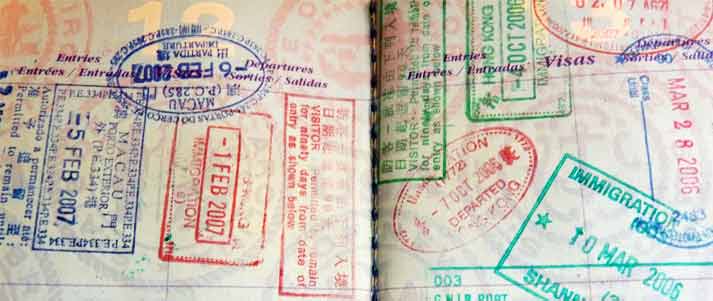Student Finance on a year abroad
Worried about the costs of doing a year abroad? There's plenty of money up for grabs, and here's how you find it...

Doing a year abroad as part of your degree is an amazing experience, but many students worry it'll be too expensive.
The reality, however, is that tuition fees abroad are often considerably cheaper than in the UK and there's loads of extra financial support out there in the form of grants and loans.
If you fancy exploring a new country, immersing yourself in another culture and gaining some invaluable skills that will impress employers after you graduate, here's all the finance stuff you need to know to turn your year abroad dreams into a reality.
What’s in this guide?
- What Student Finance can you get on a year abroad?
- Study abroad support for English students
- Study abroad support for Northern Irish students
- Study abroad support for Scottish students
- Study abroad support for Welsh students
- Extra funding for the Turing Scheme
- Repaying your study abroad Student Loan
- Other year abroad costs to consider
Can you get Student Finance for a year abroad?
In a nutshell: if you decide to do a year abroad as part of your degree, you should still be entitled to the same types of funding as you would if you were studying in the UK as normal.
In fact, taking into account travel grants and the additional money offered to those on Turing Scheme placements, you may even receive more support than in your years studying at your home university.
These are the types of funding available to students on a year abroad:
-
Tuition Fee Loan
In the majority of cases, you won't pay any tuition fees at your host university abroad. What's more, you'll usually pay a reduced level of tuition fees to your UK university, which will be covered by a Tuition Fee Loan just as normal.
However, if you're spending less than a full year abroad or you're on a work placement, the rate you pay may vary.
Where in the UK you're from, and where your home university is located, will also affect the rate of tuition you pay for your time abroad.
Read on to discover the guideline amounts and always check with your university or Student Finance body to confirm the details before committing to anything.
-
Maintenance Loan
While studying abroad, you should still get a Maintenance Loan as you would if you were doing a normal year of study in the UK.
Depending on where in the UK you're from, you may even be entitled to more than you would be at home. That's because, despite studying abroad, your Maintenance Loan (and Tuition Fee Loan, for that matter) is still paid by the Student Finance body that you apply to at home.
Again, in addition to where in the UK you're from, exact entitlements could vary depending on how long you'll be spending abroad and the type of placement you'll be doing.
Not to sound too much like a broken record, but as well as reading the information below, we'd urge you to contact your Student Finance body or university to confirm the specifics before deciding whether or not to study abroad.
-
Travel grant
As well as a Maintenance Loan and a Tuition Fee Loan, you may also be entitled to a travel grant. As a grant, this money does not have to be repaid, unlike the two loans.
And, despite what the name may imply, travel grants don't just cover the cost of the transport to and from your study abroad destination. They can also be used to pay for associated costs you'll incur as a result of studying abroad, which you wouldn't have encountered had you stayed in the UK.
What do travel grants cover?
Here are the main costs that travel grants can be used to cover:
- Flights (or journeys on other forms of transport) between the UK and your overseas destination over the course of the academic year. There may be a limit on the number of journeys you can claim for.
- The cost of return travel for any dependent children if you're a single parent. Again, there may be a limit on the number of journeys you can claim for.
- Mandatory medical insurance, visas and medical expenses that are needed for studying abroad.
Note that the grant only covers reasonable travel expenses – which means the most cost-effective tickets on the most economical form of transport. If you fancied using this to bag yourself some free first-class flights, think again!
In addition, the travel grant usually doesn't cover 100% of your costs. In most cases, you'll have to pay the first few hundred pounds of your expenses yourself. However, you may have to pay more depending on where in the UK you're from and what your household income is.
What's more, unlike the loans for tuition and maintenance, travel grants are usually paid retroactively. In other words, you'll probably have to purchase your flights (or whatever else) and submit an expense form to receive some of the money back.
It's worth checking with your university or Student Finance body to clarify your specific entitlements before making a decision either way.
English Student Finance on a year abroad

The following information outlines the financial support for English students on a year abroad. But remember, you could claim an extra grant if you're going overseas on the Turing Scheme.
Study abroad tuition fees for English students
In the majority of cases, if you're studying for a full year abroad, you won't pay any extra tuition fees at your host university abroad. In fact, you could pay a lot less than what you'd usually pay in the UK.
But exactly how much you'll be charged depends on where in the UK your home university is, as the table below demonstrates:
Year abroad Tuition Fee Loans for English students 2023/24
| Country of home university | Maximum Tuition Fee Loan |
|---|---|
| England | £1,385 |
| Scotland | £4,625 |
| Northern Ireland | £4,625 |
| Wales | £1,350 |
If you're studying abroad for less than a full academic year, you may have to pay more, as the figures in the table above only apply to students spending a whole year abroad. In some cases, this may even mean paying the full rate of tuition to your home university, but as the rules tend to vary from uni to uni, we'd advise you to check with them directly.
In some cases (usually if you're an English student in another part of the UK), you may even find that your university charges you more than the maximum loan for your year of overseas tuition. If this is the case, you'll have to find additional funding to cover the extra amount.
Study abroad Maintenance Loan for English students
As is the case when you're studying in the UK, the size of your Maintenance Loan on your year abroad will be determined by your household.
Bigger loans are on offer for those from less wealthy backgrounds, while those with higher household incomes get smaller loans. In these circumstances, the expectation is that your parents will be able to contribute to make up the shortfall.
The table below gives an indication of how much you can expect to receive during your year abroad to assist with your living costs, like rent and food. Note that we've only used these household incomes as a guide. Maintenance Loans for English students are based on your exact household income, and not grouped into bands.
Maintenance Loan for English students on a year abroad 2023/24
| Household income | Year Abroad Maintenance Loan |
|---|---|
| <£25,000 | £11,427 |
| £30,000 | £10,707 |
| £40,000 | £9,266 |
| £50,000 | £7,825 |
| £60,000 | £6,384 |
| £65,967+ | £5,524 |
Travel grants for English students studying abroad
In addition to your usual Student Finance funding, there are some extra costs that come with doing a year abroad that can be hard to cover. This is where student travel grants come in.
This is free money from the government to help you cover necessary expenses such as flights, travel insurance and visas.
How much are travel grants for English students?
| Cost of travel | Household income | Travel grant allowance |
|---|---|---|
| £1,000 | £39,796 or less | £697 |
| £1,000 | £41,000 | £560 |
| £1,000 | £42,000 | £445 |
| £1,000 | £43,000 | £330 |
| £1,000 | £44,000 | £216 |
| £1,000 | £45,000 | £101 |
| £1,000 | £45,881 or more | £0 |
Much like the Maintenance Loan, how much money you can get as a travel grant is largely dependent on your household income.
And, regardless of your household income, you must pay the first £303 of your travel costs yourself. After this, the amount you will receive is reduced by £1 for each £8.73 your household income is over £39,796.
This means that if your household income is £39,796 or less, you'll get your full costs reimbursed (minus the first £303). However, if your household income is £45,881 or more, you won't be eligible to receive any amount of travel grant.
Northern Irish Student Finance on a year abroad
The info below outlines the financial support on offer for Northern Irish students on a year abroad. But remember, if you're going travelling on the Turing Scheme, you could also claim extra funding.
Study abroad tuition fees for Northern Irish students
The rate of tuition for Northern Irish students studying abroad is dependent on three things:
- Where your home university is
- How long you'll be studying abroad for
- Whether or not you're going through the Erasmus, Turing or Taith Scheme.
Here are the maximum tuition fees chargeable to Northern Irish students studying abroad for a full year:
Year abroad tuition fees for Northern Irish students 2023/24
| Country of home university | Erasmus/Turing/Taith Scheme |
|---|---|
| England | 15% (£1,385) |
| Northern Ireland | £0* |
| Scotland | 15% (£1,385) |
| Wales | 15% (£1,350) |
* In Northern Ireland, if you're studying abroad within the Erasmus, Turing or Taith Scheme, your fees will be paid for you.
If you're studying abroad for less than a full year you may need to pay more than the amounts listed above, and this could also be the case if you're doing a work placement abroad rather than studying. Student Finance Northern Ireland recommends that you contact them directly to clarify your specific circumstances.
However, it's worth noting that in most cases you should still receive a Tuition Fee Loan to cover the full cost, which you can read more about in our guide to Student Finance in Northern Ireland.
Study abroad Maintenance Loans for Northern Irish students
The Maintenance Loan you'll be entitled to when you're studying abroad is actually bigger than the one you'd receive if you were studying in the UK for a year.
You can receive up to £8,078, although the exact amount you're entitled to will depend on your household income.
If your household income entitles you to a Maintenance Grant when you're studying in the UK (more details on that in our guide to Student Finance in Northern Ireland), you should also be eligible to receive a portion of your funding in the form of a grant when you're studying abroad too.
Travel grants for Northern Irish students studying abroad
Travel grants are available for Northern Irish students spending at least half a semester abroad. The exact amount you receive is dependent on your household income, but regardless of how large a travel grant you get, you'll need to pay the first £309 of costs yourself.
To find out exactly how much you're eligible for, you'll need to apply to Student Finance Northern Ireland.
Scottish Student Finance on a year abroad

The following information outlines the support available to students from Scotland studying abroad in the 2023/24 academic year.
But remember, you may also be available to apply for funding from the Turing Scheme if your placement is through this programme.
Study abroad tuition fees for Scottish students
How much tuition you're charged when studying abroad as a Scottish student depends on three factors:
- Where your home university is
- How long you're studying abroad for
- What type of study abroad programme it is.
When it comes to the type of study abroad programme, it's important to know the difference between an exchange programme and a non-exchange programme.
As the name suggests, in an exchange programme, a student from a UK university swaps places with one from outside the UK. Any study abroad programme where you're not swapping places with a student from another uni is classified as non-exchange.
If you're unsure what type of programme you'll be taking part in, check with your university.
Year abroad tuition fees for Scottish students in Scotland 2023/24
Good news! If you're a Scottish student whose home university is also in Scotland, studying abroad often shouldn't affect your tuition fees in any material way.
This is because, while there are technically tuition fees for Scottish students (£1,820 a year), the amount is usually covered in full by Student Awards Agency Scotland (SAAS) on your behalf.
The amount that they pay for you may change. For example, if you're on a non-exchange programme for the full year (or you're at your home university for less than 10 weeks), SAAS will only need to your university half the normal fee.
But however much SAAS are paying on your behalf, it's still effectively free for you. And if you're after more info on how free tuition in Scotland works, head to our guide to Student Finance in Scotland.
Year abroad tuition fees for Scottish students in the rest of the UK 2023/24
| Type of study abroad programme | Maximum Tuition Fee Loan |
|---|---|
| Exchange (full year) | Full amount |
| Exchange (part-year) | Full amount |
| Non-exchange (full year) | 50% |
| Non-exchange (part-year) | Full amount* |
Remember that although you can be charged full fees for the full year, that doesn't mean you will be. The amounts in the table above are just the maximum levels of loan available, so you should check with your own university to make sure.
In most cases, SAAS will give you a Tuition Fee Loan to cover the cost, although if you're doing a full year non-exchange programme, you should check with your university to see if they'll be charging you above the half-rate (which is the maximum amount SAAS will pay here).
Our guide to Student Finance in Scotland has everything you need to know about applying for funding.
Study abroad Student Loans for Scottish students
Unlike in the rest of the UK, Maintenance Loans (more commonly known as Student Loans in Scotland) and bursaries for Scottish students don't change depending on where you live while studying – even if it's abroad. The only factor that affects the amount you receive is your household income.
Student Loan for Scottish students on a year abroad 2023/24
| Household income | Loan | Bursary | Total |
|---|---|---|---|
| £0 to £20,999 | £7,000 | £2,000 | £9,000 |
| £21,000 to £23,999 | £7,000 | £1,125 | £8,125 |
| £24,000 to £33,999 | £7,000 | £500 | £7,500 |
| £34,000+ | £6,000 | £0 | £6,000 |
Note that, unlike in the rest of the UK, the Scottish Student Finance system does use bands to group household incomes.
So, if you're in the same income band as another student – say, yours is £25,000 and theirs is £32,000, meaning you're both in the third band – you will receive the same amount as them. This is in contrast to the other Student Finance bodies in the UK, which pays you an amount based on your exact household income.
Travel grants for Scottish students studying abroad
If your time spent studying abroad is a compulsory part of your course and not a paid placement, you can also claim back the cost of your travel and medical insurance.
The amount you're entitled to isn't dependent on your household income. SAAS will send you the form if you state that you'll be doing a compulsory year abroad on your Student Finance application.
Welsh Student Finance on a year abroad
The following information outlines how much funding students from Wales can expect to receive in the 2023/24 financial year. And, just to remind you once again, if you're taking part in the Turing Scheme, additional money may be available in the form of a grant.
Study abroad tuition fees for Welsh students
Tuition fees for Welsh students studying abroad depend on where your home university is in the UK. But in most cases, if you're spending a year abroad, you should only be paying 50% of your usual tuition fees, at most.
Year abroad Tuition Fee Loans for Welsh students 2023/24
| Country of home university | Maximum fees for Turing/Erasmus+ | Maximum fees for other placements |
|---|---|---|
| England or Wales | 15% (£1,350 or £1,385) | 15% (£1,350 or £1,385) |
| Northern Ireland | £0* | 50% (£4,625) |
| Scotland | 15% (£1,385) | 50% (£4,625) |
* In Northern Ireland, if you're studying abroad within the Turing Scheme, your fees will be paid for you.
If you're studying abroad for less than a full year, you may need to pay more than the amounts listed above – possibly even the full rate of tuition. Rules tend to vary depending on your university's own policy, so we'd recommend checking with them directly.
However, in most cases, your tuition should be covered by a Tuition Fee Loan from Student Finance Wales, which we cover in more detail in our guide to Student Finance in Wales.
Study abroad Maintenance Loans for Welsh students
As is the case when you're studying in the UK as a Welsh student, you should be entitled to receive a mix of both a Maintenance Loan and Maintenance Grant while you're studying abroad.
The exact split will be determined by your household income, with students from less privileged backgrounds receiving a greater proportion of their funding as a grant and those from richer households receiving more in the form of a loan.
But, regardless of your household income, you'll receive exactly the same amount of money as other Welsh students studying abroad. It's only the split of loan versus grant which varies.
The amount on offer is the same as that offered to Welsh students studying away from home but outside of London, so if that already applies to you, you'll likely end up with a very similar amount of money as you have in previous years.
Maintenance Loan for Welsh students on a year abroad 2023/24
| Household income | Grant | Loan | Total |
|---|---|---|---|
| £18,370 or less | £8,100 | £3,620 | £11,720 |
| £25,000 | £6,947 | £4,773 | £11,720 |
| £35,000 | £5,208 | £6,512 | £11,720 |
| £45,000 | £3,469 | £8,251 | £11,720 |
| £59,200+ | £1,000 | £10,720 | £11,720 |
Just remember that the values in the table above are just indicative examples. For Welsh students, Maintenance Loans are calculated based on exact household incomes rather than in bands. We've just used round numbers in the table to give you a rough idea of what to expect.
Travel grants for Welsh students studying abroad
Welsh students studying abroad are also entitled to a travel grant, although as is the case for students from elsewhere in the UK, you'll have to pay at least some of the costs yourself.
If your household income is lower than £59,200 a year, you'll only need to contribute the first £303 of your costs.
However, if your household income is £59,200 or more, there's a pretty sudden jump. You'll have to stump up the first £1,000 of your costs.
Turing Scheme funding

Credit: Megan Eaves - Flickr
Since September 2021, there's been a new way to study abroad: the Turing Scheme. It's a replacement for the Erasmus+ programme, as the UK can no longer participate after leaving the EU.
This new programme has a lot of similarities to its predecessor, but also some key differences too. Crucially, unlike Erasmus+, the Turing Scheme provides placements across the world, not just in Europe.
Turing Scheme tuition fees 2023/24
The government expects overseas universities to waive tuition fees as they'll be exchanging students with UK unis (so, for students, it basically operates in the same way as Erasmus+). In the unlikely event that the host university doesn't waive the tuition fees, the Turing Scheme won't be able to cover them.
On top of that, you'll still receive a Tuition Fee Loan to cover the cost of the fees at your home university.
Turing Scheme grants
The Turing Scheme awards grants to participating students to help with the cost of living in their host countries. This is in addition to a Maintenance Loan, which you'll still be able to receive as outlined earlier. And yes, as it's a living cost grant, it doesn't have to be paid back!
How much you receive partly depends on where in the world your host university is. Each country falls into one of three categories but, for the purposes of funding, groups two and three are treated as one.
As well as where you're studying, how big a monthly grant you receive is dependent on how long your placement is. The table below spells out exactly how much you can get based on your circumstances.
Turing Scheme living cost grants 2023/24
| Placement length | Monthly group one country grant | Monthly group two/three country grant |
|---|---|---|
| Four to eight weeks | £545 | £480 |
| Nine weeks to 12 months | £380 | £335 |
Extra Turing Scheme funding for disadvantaged students 2023/24
| Placement length | Monthly group one country grant | Monthly group two/three country grant |
|---|---|---|
| Four to eight weeks | £654 | £590 |
| Nine weeks to 12 months | £490 | £445 |
There's also extra cash on offer for students from disadvantaged backgrounds, whom the Turing Scheme broadly defines* as anyone who:
- Has a household income of £25,000 or less
- Is receiving Universal Credit or other income-related benefits
- Is, or has previously been, in care
- Has caring responsibilities
- Is estranged
- Is a refugee or asylum seeker.
* There are some more detailed criteria applying to a few of these points, so we'd recommend checking with the Turing Scheme or your university to confirm.
Turing Scheme travel grants 2023/24
| Distance between home and host uni | Travel grant |
|---|---|
| 10km – 99km | £20 |
| 100km – 499km | £165 |
| 500km – 1,999km | £250 |
| 2,000km – 2,999km | £325 |
| 3,000km – 3,999km | £480 |
| 4,000km – 7,999km | £745 |
| 8,000km – 12,000km | £905 |
| 12,000km+ | £1,360 |
The Turing Scheme also provides funding to cover the cost of travelling to and from your study abroad university.
The amount you receive depends on how far away your host university is from your home university, and in most cases, the money is only available to disadvantaged students (based on the criteria above).
However, whether you're classified as a disadvantaged student or not, you may be able to get some extra funding for what the Turing Scheme describes as "exceptionally expensive travel".
If you're able to prove that the standard funding offered by the Turing Scheme doesn't cover at least 70% of your travel costs (which need to be reasonable – you can't be buying first-class tickets), extra financial help is available.
How to apply for the Turing Scheme
You'll need to apply for the Turing Scheme through your university, as each uni registers for the scheme and receives funding individually. As it's a new programme, be aware that your university may not take part straight away.
Repaying your study abroad Student Loan
Your Tuition Fee Loan and Maintenance Loan from your year abroad will simply be added to your total student debt for you to pay off after you graduate.
However, don't forget that grants (including Travel Grants and funding from Turing) do not have to be repaid. This is essentially free money, and won't add to the overall cost of your degree.
And don't panic if your year abroad equates to adding an additional year to your degree. Although it might make your total student debt larger, it's likely that you'll never have repaid three years' of debt before it's wiped after 30 or 40 years, let alone four! Try out our Student Loan repayment calculator to see for yourself.
If you want more information, we've got a whole guide about repaying your Student Loan to take you through it – it's not as scary as you think, we promise.
Year abroad costs to consider
We've covered all the money that's available to you on a year abroad, but where will it all go? These are the costs you'll need to budget for on a year abroad:
-
Enrolment fees
Although you most likely won't have to pay tuition fees at your university abroad, there might be some compulsory enrolment or admin fees that you'll need to factor in.
These are particularly common at universities in the USA, and cover things like orientation events, social activities and course administration. Check with your individual university for specific details.
-
Visas
Now that the UK has left the European Union, the days of a guaranteed, visa-free placement in Europe are long gone. There's now a chance that, depending on which country you'll be studying in, you may need to pay for a visa to legally study there.
This is even more likely to be the case if you're studying outside of Europe, and a visa can cost you anything from £50 to £500 (or even more!).
Luckily, you should be able to apply for a travel grant to cover this – but you might have to budget for the cost at the start of term.
In some countries you also have to prove you'll be able to support yourself financially while you're there (by having a certain amount of cash in the bank), so check this out before you apply.
Also, make sure you don't book any flights until your visa is completely sorted! There can sometimes be hold-ups and delays, and you might not be able to enter the country without a visa in place.
-
Insurance
Check if your university offers any free travel insurance as part of their study abroad scheme.
If they do, you might not need to worry about insurance at all – but bear in mind that some countries mYearight have mandatory health insurance for international students, or you might want to opt for an extra level of cover.
Again, a travel grant should be able to help you cover this cost.
-
Vaccinations
This probably won't be an issue in most places, but some might specify you need to have had certain vaccinations before you arrive in the country (again, this is quite common at universities in the USA and South America).
You can get a lot of vaccinations free of charge on the NHS, but for some, you might have to go elsewhere and pay for them. As always, check individual universities' policies for details.
-
Travel expenses
Don't forget the cost of travelling to your study abroad country! You'll probably want to come home to visit at Christmas and Easter, so the cost of flights can soon stack up.
Plus, one of the best parts of studying abroad is getting the opportunity to explore a new country, so you'll probably want to budget some extra travel costs in order to do that. However, unlike the cost of travelling to and from your host country, travelling for leisure is unlikely to be covered by a travel grant.
Want to brush up on your language skills before you leave? There are loads of ways to learn a new language for free at university.








